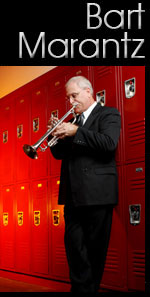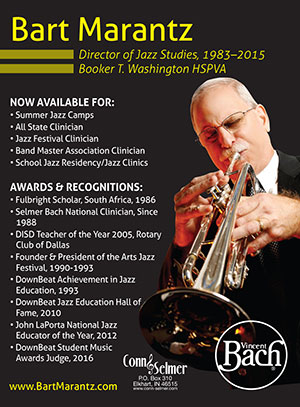 Home B.M.P. BTWHSPVA Articles Interviews Reviews Books Biography Videos Photos Calendar Music Links Contact Sara Marantz Matt Marantz Luke Marantz
Bart Marantz NPR/KERA Jazz Education Interview    Click below to listen to the interview  Click below to read the article 
|
Articles Jazz Trumpet Marvin Stamm performing with the BBC Big Band - ITG Conference - Manchester England - July 2, 2002 In Response This area is for those of you desiring to respond, pro or con, to my writings in the "Cadenzas" section of this website. Please feel free to express your own views on various subjects to which this website pertains: music, culture, education and other subjects that relate to the society in which we live. Click here to email your response In Response To: Cadenzas - Edition VII Bart Marantz - has been teaching jazz studies at the Booker T. Washington High School for the Performing and Visual Arts for 20 years. During this period the music program has won 129 "Down Beat Student Music Awards." Bart is a 1986 Fulbright Scholar. He founded the "Arts Jazz Festival" raising a quarter of a million dollars in scholarships and was the recipient of the "Down Beat Jazz Education Achievement Award" in 1993. Bart is a Selmer Clinician and co-author of "Jazz Figure Reading Studies" and a contributing author of "Selected Trumpet Master Classes" and IAJE/MENC's curriculum guide "Teaching Jazz: A Course of Study." He has been a "Jazz Educators Journal" (IAJE) staff music reviewer since 1989. He has studied with jazz educators, Jerry Coker, Dan Haerle, David Baker, Jamey Aebersold, Jaki Byard, Phil Wilson and George Russell at The University of Miami, Indiana University and the New England Conservatory of Music. Bart just recently formed the "Sammons Jazz Youth Orchestra." This organization of outstanding high school jazz talent in the Dallas/Fort Worth area performs throughout the Dallas Metroplex and in it's first year of existence the group has been accepted to the Toronto IAJE conference. He writes: Marvin, I have enjoyed reading your web version of “Cadenzas" for some time now and although I very rarely respond to these calls for opinions and suggestions, I decided to send this response to you anyway. I have known you since I was 20 years old and have always had an immediate learning experience just listening to your masterful trumpet work. You have always been a mentor and a friend, and I thought I might be able to share an idea or two that will add to the positive side of our most important profession, teaching music. I also want to add that I have known, worked with, learned from and admired Bob Morgan for the past 20 years. I had heard of his work even before I came to Texas and met him. Bob has recently retired from his position as a full-time director of jazz studies at one of North America's most respected and productive performing arts high school jazz programs, HSPVA in Houston. He and his students have proven that with both sides working for the good of the art the end is positive every time. Even though the teaching profession does have its frustrations and negatives, I would like to thank all those who have served as my mentors and teachers over the years for hanging in there with and for me. Let me share just one story with you about how the teacher - student relationship should be at its best. In 1970 a young aspiring trumpet player, who at the time was in school at Indiana University, wanted to quit his studies again and go back out on the road. School was confining, and teaching was just not what he wanted to do. Heck, he was a jazz performance major trying to get enough information together to just get his chops in line and continue the joy of playing every night and every day. He was studying with trumpet teacher, William Adam, who to this very day continues to be a mentor, and with Jamey Aebersold, who was about to release his first vinyl play-along "How To Play Jazz and Improvise - Volume #1." He had to drive an hour and forty five minutes each way for his weekly lesson with Jamey, but it was worth it. One day in a lesson during this period, the trumpet student told Jamey he had had it with school and was quitting the University thing! Jamey, who to me is still one of the heroes of our industry and will do anything for jazz and jazz education, said, "Why don't you stop by the Village Vanguard while you are working in New York next week and speak to a friend of mine named Marvin Stamm. Jamey went on to talk about the fact that as a trumpet player and aspiring jazz musician the young man could hear first hand one of the gems of big band jazz playing and writing, the Thad Jones - Mel Lewis, Orchestra and take in audibly what his quest was as a musician. Jamey said that his friend, Marvin, was a trumpet player in that band and that he would advise and direct this young musician just for the asking! The trumpet player took Jamey's advice and went to the Vanguard on a Monday night in 1970, and as he was walking down the stairs to the club he heard some of the most powerful and creative jazz he had heard since experiencing Duke Ellington and his band in high school. The music was almost too overwhelming, but on the break the young man went to the kitchen where all the musicians were hanging out to find Marvin and ask him a few questions that would help him decide what step to take next. After he introduced himself to Marvin as a student of Jamey Aebersold, David Baker, Jerry Coker and Bill Adam, Marvin asked him to wait around until the band finished the last set, and said he would be happy to sit down and try to answer any questions concerning the young man's future in this business of music. Marvin and the twenty-year- old hooked up about 1 a.m. and talked until 5 a.m. in the morning! Marvin did not know this person, had never met him before, and had nothing to gain by spending these long hours with him trying to guide him through some very important decisions in his life. But the music and the student of the music were so important to him that he was willing to take time to try to direct this young musician toward a successful outcome in his career. I think the final result was a positive one. The young trumpet player went back to school, finished his degree and subsequently played on a number of different bands. After years of active road time he became a teacher in the field of jazz music and has tried to continue the "hands on" tradition he experienced with Marvin way back in 1970. Yes, this student and very confused young man was me! I am currently Director of Jazz Studies at BTWHSPVA in Dallas, Texas. Marvin, you never hesitated for a moment in giving of your time and knowledge to someone you had never met before this encounter! I try to incorporate this spirit into my classroom as I reach out to each student and try to positively affect his/her life and be available on a "one to one" basis when the need arises. We will never know how this kind of interaction will eventually affect their futures, as well as, the music we love. Today the jazz program at Booker T. Washington HSPVA has at least three young musicians who I feel will someday make a statement in the music we call jazz. They are all special voices for their respective instruments. The joy I receive from them musically is something that is hard to describe. But, the fact that I can learn from them every day when I'm around them is also a very exciting and rewarding part of my job. Yes, there have been a number of times when I have wanted to simply pack it up and try playing again for a living. There have been some negative moments that would discourage many from teaching, but I know the Lord has blessed me with a vocation, in a place he has set aside for me, and there is a certain joy in knowing you belong where you are. I hope I have been able to convey my message. We never know who we are working with and how we may affect each student. There is a tremendous responsibility tied to this vocation and the art form it represents. Unfortunately, sometimes administrations, parents, and even a student or two, can distract us from our goal of keeping the music alive and well. To those who are discouraged, remember, there are people like Marvin Stamm and the above mentioned mentors who show us all that being receptive to and caring about each student will bring out the essence of what we are to do as instructors. This kind of attitude only raises the level of our profession and will sustain the music we teach. Care about one another and the music will carry on. (Marvin’s note: I thank Mr. Marantz for his most complimentary remarks regarding any positive role I may have played in his excellent career. Usually I would not publish something as this so as to avoid the appearance of being self-serving, but in the spirit of an “open forum,” I cannot encourage people to freely express their thoughts and then dictate what they may or may not say - whether pro or con. Recently, someone to whom “Teachers” was forwarded emailed me, taking me to task for something that occurred at the Kenton Clinics in, I believe, 1962. He felt I had insulted him in a class, and he had been carrying this within himself since then. I responded that if the event happened as he recalled, I apologized and asked him to credit it to the inexperience and attitude of a young man who thought he knew more than he actually did. Over several emails, we resolved the issue, and I believe I asked him if he wanted me to post his original email but believe he declined. (*If this is not true and that person reads this and wants that email posted, he should get in touch with me.) The point is that, as long as a “response” is relevant to the subjects and is appropriate in its expression and is respectful, not personally attacking anyone, I will not dictate what one can or cannot write. If anyone feels that my printing Mr. Marantz’ article is self-serving, I cannot apologize as I did not write it, but I am sorry if anyone supposes this to be the case; it is not meant to be so.) |


